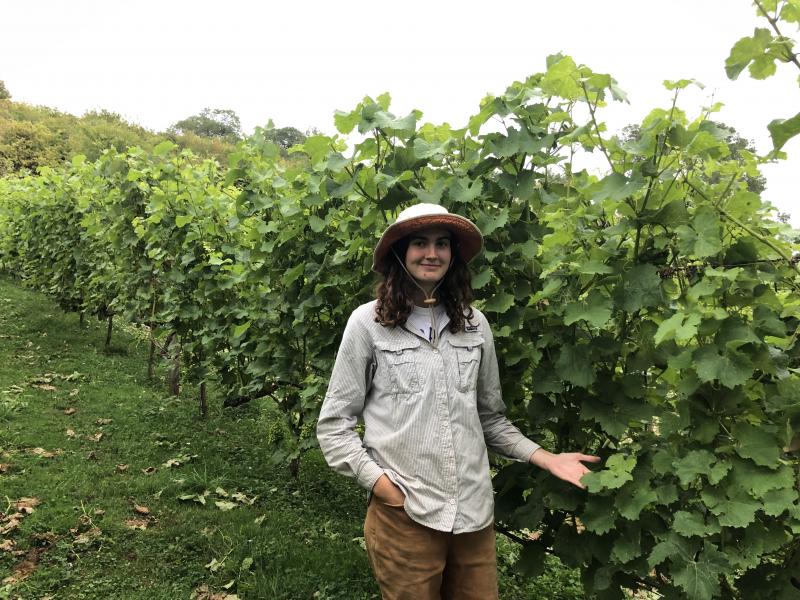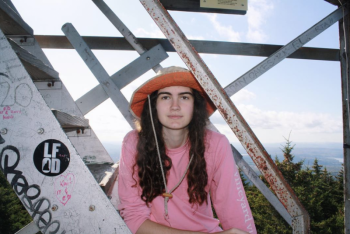SYDNEY, Australia — A few months shy of her 21st birthday, Belfast native Callie Cook is not legally old enough to consume wine in the United States, though that detail has not halted her progress learning the ins and outs of the winemaking industry.
“Winemaking is the diffusion of art, science, and culture, and engages many hands to create a product for human enjoyment, to me, wine is very special, and to participate in this ancient practice is the greatest pleasure,” she said.
Cook’s interest in the winemaking industry began as a senior at the Tilton School, a boarding school in New Hampshire, as she struggled to decide on a topic for her required capstone project that provides, as she described, students the opportunity to explore a personal interest and present it to the community in any way they choose.
“I liked the defiant nature of the idea, as I was only 17 at the time and thought it would be incredible to justify spending class time researching wine,” she recalled. “Still, I submitted the proposal with the intention of them rejecting it, so it was really just a ploy to buy myself more time to think of a different project. To my surprise, the administration didn’t shut it down, so I went with it.”
Before long, she fell down a rabbit hole, of sorts, learning all she could about the industry, and the product itself.
“Originally, I was amazed at the part wine plays in social gatherings and how a material object facilitates human connection,” she said. “However, when I began diving into the topic I quickly became overwhelmed with how expansive wine is, and all the various routes I could go down. Over the course of the year my project took many forms, I dove a bit into sensory analysis, the sommelier industry, grape growing, the history of winemaking, major regions around the world, but eventually I ended up writing my thesis on Viticulture and Enology in New England.”
The component of the project most fundamental in developing her affinity for wine, however, was the community outreach portion that encouraged students to make connections with relevant industry professionals locally. Reaching out to local experts and visiting vineyards and wineries throughout the New England region, Cook was able to better understand what a career in the industry would be like as she studied the ins and outs of the industry up close.
“I was particularly inspired by the late Clem Blakney of Younity Wines, whom I met at the United Farmers Market of Maine in Belfast,” she recalled. “When I spoke to him he was so passionate. To me, he seemed not only proud of the product he was able to create from the environment but the gift of sharing it with the community. The passion and genuine drive seemed to be a common thread through the industry and that confirmed to me that winemaking was a meaningful thing to do.”
Since Cook is not of legal drinking age in the United States, professional opportunities in the U.S. were limited once she graduated high school, thus sending her to Europe and Australia to study the art of winemaking hands-on until her return in the next few months, shortly after celebrating her 21st birthday.
“I’ve worked towards earning industry standard credentials through the Wine and Spirit Education Trust (WSET), which you have to be of legal drinking age to take, I feel lucky to have a head start on things,” she said. “WSET is a London based school which is where I took my Level two [award exam] and then I took my Level three [award exam] in Sydney. Some wine programs in the US allow students to take basic courses in viticulture and enology but you have to be 21 to taste, which is an essential skill to develop to assess its quality and detect faults.”
Cook spent most of 2019 in Europe apprenticing on vineyards and wineries before her ventures took her to Australia to continue her studies with an emphasis on the business side of the industry.
While in Australia, she has worked in a wine store and cellar door, hopes to work the 2021 harvest before leaving, and raised funds in support of recovery efforts following the early 2020 Australian fires. (She has also experienced the COVID-19 pandemic in Australia, and shared her insight on that here.)
In technical terms, Cook has so far, among other vineyard and winery activities, learned to use a refractometer to measure sugar levels, operate a destemmer machine, conduct daily temperature and density tests during fermentation, prune and plant vines, and harvest grapes. Cook is most interested, she says, in biodynamic agriculture and the traditional method of sparkling wine production.
“Traveling to wine regions around the world has given me a global perspective of the varying philosophies and cultural [significance] of wine, as well as introducing me to different winemaking styles and grape varieties unique to certain parts of the world,” she commented. “Through my travels to Italy, Turkey, England, the Netherlands, France, and Australia interacting with dozens of viticulturalists, enologists, sommeliers, wine writers, etc., I’ve been exposed to different approaches to thinking and experiencing wine, and remain endlessly inspired by human lives committed to the advocacy of grapes.”
During her hands-on studying, Cook has strived to gain enough experience and earn credentials to become an asset to the wine industry in the U.S., and through working in different facets of the industry is most drawn to enology, the science of winemaking.
“I plan on studying enology [...] when I return to the States, although I am a big believer in experiential learning, especially for all the technical components of winemaking, there are gaps in my understanding that university [enology courses] will help fill,” she stated. “I hope to find a job in enology as a laboratory technician or assistant winemaker to start. It’s my ultimate goal to own a vineyard and winery.”
Through her experience in the industry, thus far, Cook has developed some personal goals.
“In my life I hope to contribute to a few things, including dismantling the elitism of wine, supporting sustainable practices, and pushing the boundaries of winemaking by experimenting with different grape varieties and techniques,” she said.
Being repeatedly on the move in a short time span has presented memorable experiences, and created challenging aspects, to Cook’s early ventures in the industry.
“The most humbling aspect of my travels is knowing that I’ve used my hands to nurture parts of the earth around the world and facilitated growth for hundreds of vines just by caring for them,” she said. “I’ve been able to plant vines that will be there for decades and crushed grapes to be made into wine for countless people to enjoy. The most challenging part is moving around so frequently and leaving projects unfinished; I’d like to spend an entire year in one place so I can see a whole vintage develop.”
Her time in the Midcoast and in New Hampshire played important roles in preparing her for her ventures around the world and into the winemaking industry.
“The outdoor education I received at Midcoast Maine schools was a great privilege in my upbringing,” she commented. “From planting flower gardens at Captain Albert Stevens, and building vegetable beds at Troy Howard, to taking horticulture classes at Islesboro Central School, I’ve always been exposed to the environment around me and taught how to interact with it mindfully. Going to boarding school helped me gain the independence needed to be a long-term solo traveler. As well of course the opportunity to do my capstone project in the first place, and the resources available for me to complete the project.”
More importantly, though, her time growing up in New England has instilled in her some of life’s important lessons.
“I’ve existed in communities that have celebrated individuality and alternative lifestyles enough to instill me with the belief that I can contribute to things that matter to me, even if it takes some creativity and self determination to actualize my dreams,” she said.





























